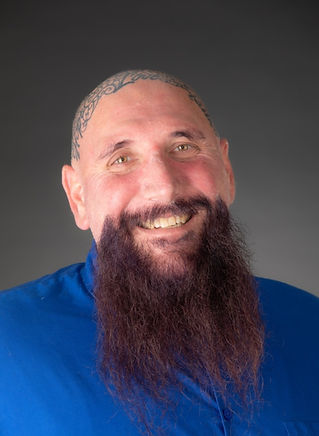
ABOUT ME

I’m Junior, a Licensed Clinical Social Worker — but I don’t look or sound like the “typical therapist.” My tattoos and tough exterior often catch people off guard, but what they quickly learn is that behind that exterior is a deep well of warmth, compassion, and commitment.
I know what it means to struggle. My own past includes addiction and living a rough lifestyle, and it’s those lived experiences that fuel my passion for this work. For the last 10 years, I’ve specialized in helping people navigate addiction, grief, trauma, and mental illness. I connect especially well with combat veterans and individuals who have experienced violence and abuse, because I understand both the weight of those experiences and the resilience it takes to move forward.
I believe perception is the key to everything. As Epictetus once said, “People are disturbed not by things, but by the views they take of them.” Nothing is inherently good or bad until we assign meaning to it. In my work, I help clients reframe harmful perceptions, integrate their spiritual beliefs if they choose, and see the world differently — in ways that open doors to healing.
My approach is something I call “sternly coddling.” I bring honesty to the table, pointing out the hard-to-see truths, but I do it within a safe, supportive space where growth feels possible. I walk beside you, not above you.

Who I Work Best With
If you’ve ever felt like you don’t quite fit, like the world keeps trying to put you in a box that was never meant for you, you’ll probably feel at home here. I work well with people who’ve lived through hard things — trauma, addiction, grief, or the weight of mental illness — and are ready for something different than the same old therapy talk. Many of my clients are veterans, survivors of violence, or people who carry the kind of scars you don’t always see on the surface. Others come to me because they’re tired of feeling misunderstood, dismissed, or “too much” for the people around them.
In my office, you won’t have to edit yourself or downplay what you’ve been through. You’ll have space to be heard, to tell the truth about your experiences, and to know that you’re not being judged for it. My goal is to create a space where you feel both supported and challenged — a place where we can untangle the things that hold you back while also building something new.
Therapy with me isn’t about fixing you because you’re not broken. It’s about helping you see yourself differently, uncovering strengths you may not even realize you have, and finding ways to live a life that feels freer, more grounded, and more meaningful. You’ll leave our work together not just with coping skills, but with a stronger sense of who you are and where you’re going.
WHY PEOPLE CHOOSE ME
Most of the people I work with tell me that for the first time in a long time, they feel understood. They don’t feel like they have to censor their story or soften the rough edges of their truth. They describe feeling safe, but also challenged in ways that push them to grow. Many say that working with me feels less like being “in therapy” and more like finally having someone who gets it, who can walk alongside them without judgment but also won’t let them stay stuck.
WHAT THERAPY WITH ME FEELS LIKE
Working with me is honest, direct, and compassionate. You can expect conversations that are real and sometimes uncomfortable, but never cold. You’ll hear hard truths, but you’ll also feel supported as you face them. I call my style “sternly coddling” because I believe the most healing work happens when you’re both challenged and cared for at the same time. At the end of the day, therapy with me is about creating a space where you can show up fully as yourself and begin building a life that feels like yours.

WHAT I SPECIALIZE IN
The people I work with often carry heavy stories — grief, trauma, PTSD, and the scars of addiction or violence. Some come searching for spiritual growth, wanting to find meaning in their experiences and a deeper connection to themselves and the world. These are the places I specialize in.
I use evidence-based approaches like Cognitive Behavioral Therapy (CBT) and Dialectical Behavior Therapy (DBT) to give you practical tools for the day-to-day moments when your mind feels overwhelming. CBT helps us look closely at the patterns of thought that keep you stuck and teaches you how to reframe them in ways that build resilience and clarity. DBT brings in skills for managing intense emotions, improving relationships, and learning to stay steady in the middle of chaos.
For trauma and PTSD, I often use Accelerated Resolution Therapy (ART), a powerful and focused approach that helps your brain process painful memories without needing to relive them in detail. Many people find that ART brings great relief in just one or two sessions, often helping them feel lighter and freer more quickly than they expected. One of the reasons ART works so well is that you don’t have to talk about the details of your experience for it to be effective — painful memories, battlefield losses, or other deeply personal events can remain unspoken, while your brain still does the work of releasing their grip. If you’re someone who likes the deeper technical details, I’ve included more information at the bottom of this page that explains exactly how ART works.
Alongside these methods, I draw on philosophy and spiritual insight — because healing isn’t only about symptom relief, it’s also about meaning. Through philosophical questioning and honest conversations, I’ll challenge the way you see yourself and the world. Together, we’ll explore not just how to feel better, but how to live in a way that feels more authentic, grounded, and purposeful.
In my practice, therapy isn’t about a single technique — it’s about finding the right balance of tools, insight, and support that fits you.

WHAT TO EXPECT IN THERAPY
Starting therapy can feel intimidating, especially if you’ve never done it before or if past experiences left you feeling unheard. In our first session, we’ll simply talk about what brought you here and what you’re hoping to find. You don’t have to have the “perfect” words or even know exactly what you need — just show up as you are. My role is to listen, to help you sort through the noise, and to start creating a path forward that feels possible for you. Over time, therapy will become a place where you can be honest, challenged, and supported all at once. You’ll leave sessions not only with insight, but with practical tools you can use in your day-to-day life.

Services I Offer
I provide individual or couples therapy for adults who are navigating trauma, PTSD, addiction recovery, grief, or major life transitions. Sessions are available both in-person and through telehealth, giving you the flexibility to choose the setting that feels most comfortable.
While individual work is the foundation of my practice, I also support clients who are seeking spiritual growth or who want to integrate philosophy into their healing process. My approach adapts to your needs — whether you’re looking for focused trauma work, guidance in making sense of life’s bigger questions, or steady support in building new coping strategies.
Insurance & Payment
I accept many major insurance plans, which helps make therapy more accessible for those who want to use their benefits. If you’re planning to use insurance, click the link below to check your coverage and get started. For those who prefer not to go through insurance or who may not have it, I offer private pay options. A sliding scale is available because I believe therapy should be within reach — we can talk about what works best for your situation.
What is ART?
Accelerated Resolution Therapy, or ART, is a short-term, evidence-based approach that helps the brain reprocess traumatic or painful memories in a way that reduces the emotional charge connected to them. It combines elements of cognitive therapy, memory reconsolidating, and eye-movement techniques to create rapid change.
One of the unique features of ART is that you don’t have to talk through the details of your trauma or loss for it to work. Instead, you hold the memory in mind while engaging in guided eye movements, which helps the brain “store” the memory differently. The event itself isn’t erased — but the distress, physical reactions, and emotional intensity tied to it are significantly reduced.
Research shows that ART can often bring lasting relief in as few as one to five sessions, with many people experiencing a major decrease in symptoms after just one or two. It has been found effective for PTSD, anxiety, depression, grief, phobias, and other trauma-related struggles.
Put simply: ART helps your brain keep the story, but let go of the pain.

GET STARTED
Taking the first step can feel like the hardest part — but it doesn’t have to be. If something you’ve read here resonates with you, I invite you to reach out. Whether you’re ready to dive into therapy or just want to see if we’re a good fit, a consultation is a great place to start. You don’t need to have everything figured out before contacting me. Just let me know a little about what you’re looking for, and we’ll take it from there together.

